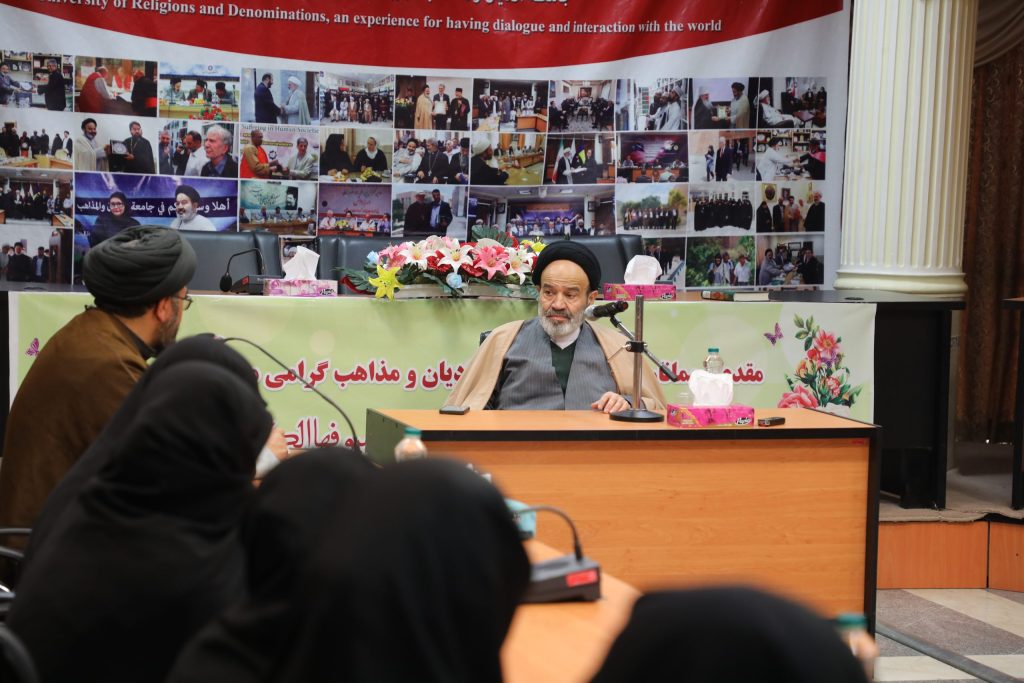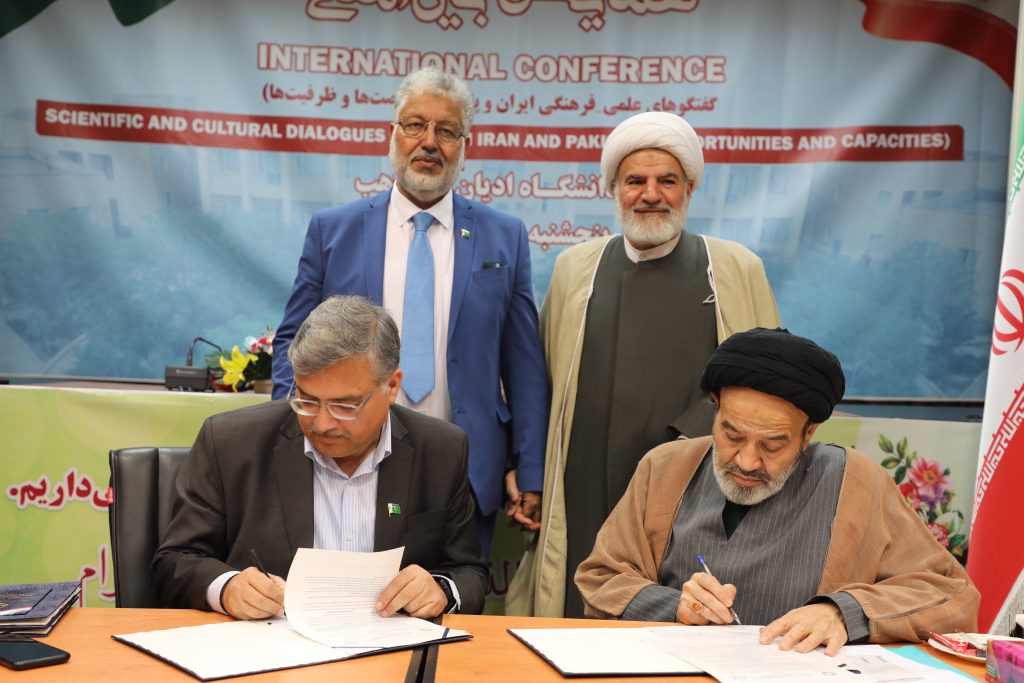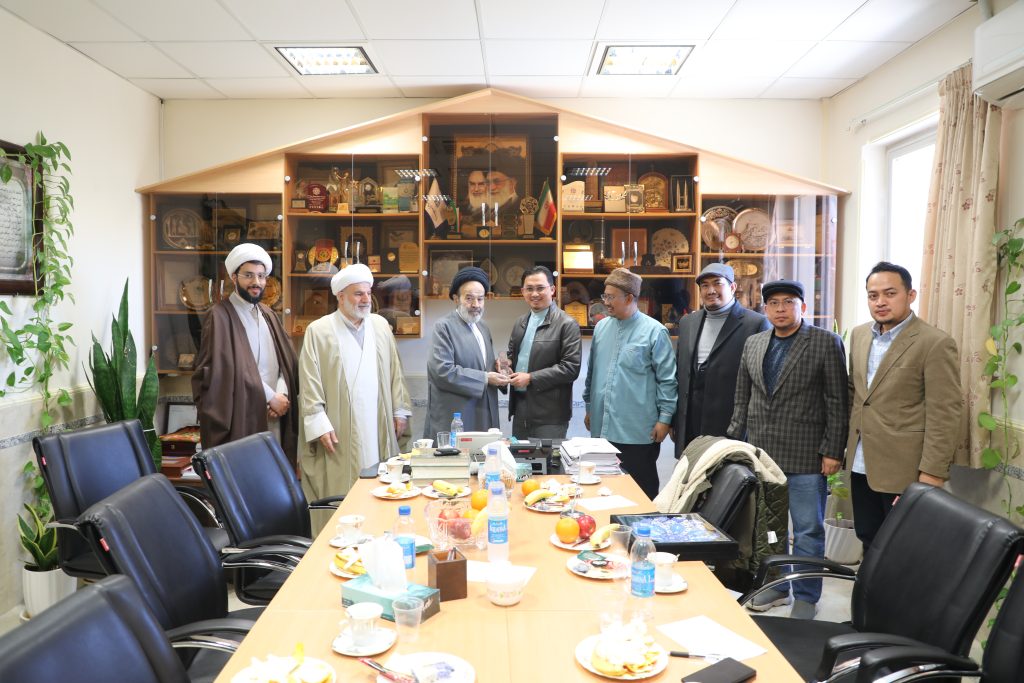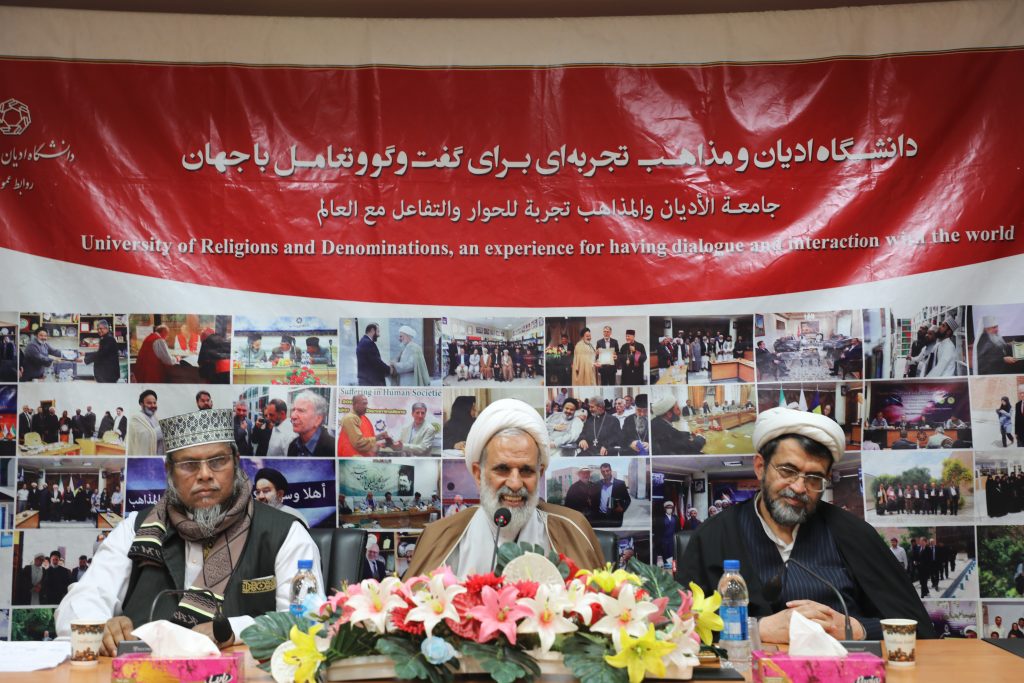Not religion, but the pervert misuse of religion by human beings is the source of conflict and violence
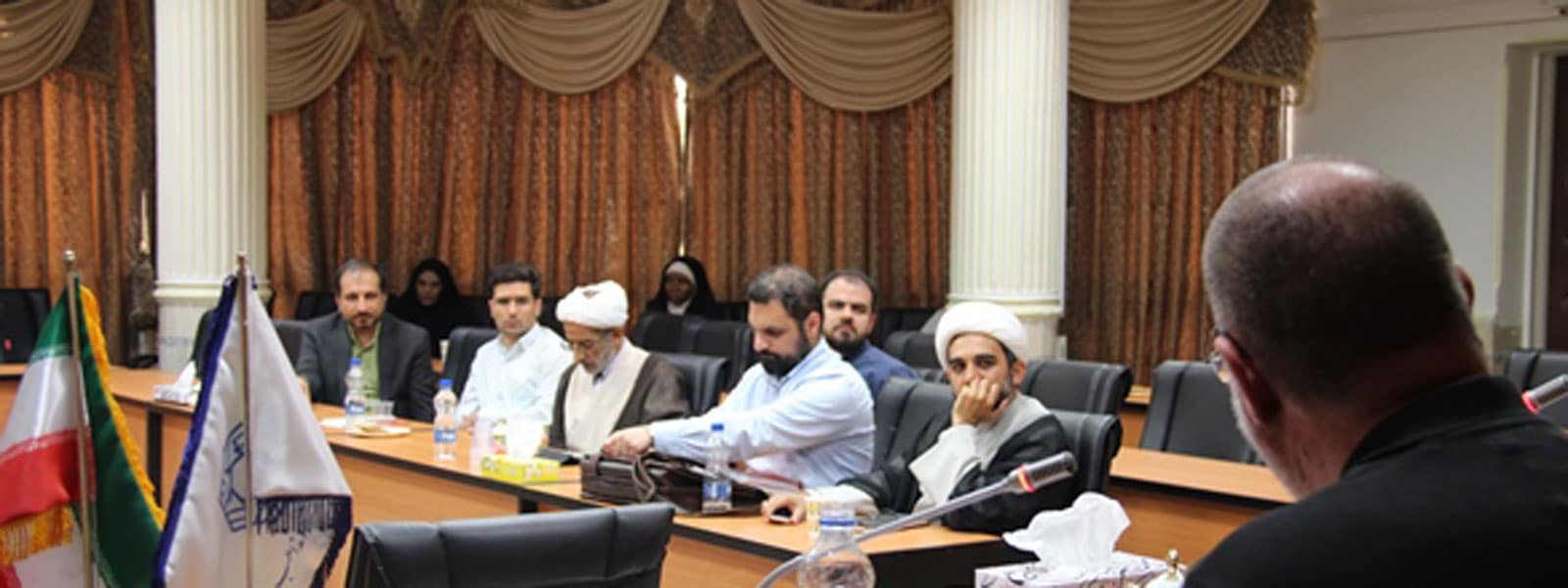
Prof.Hans-Christian Günther, a German classical philologist presenting a lecture in the University of Religions and Denominations stressed that: “Not religion, but the pervert misuse of religion by human beings is the source of conflict and violence in the world today.
Prof.Hans-Christian Günther, from the University of Freiburg, delivered a lecture on: Religion and politics: is religion a source of violent conflict or not?
The lecture was held with the presence of some professors and students in Sadr Hall of the University of Religions and Denominations in 27 June 2018.
You can read whole his lecture below.
Religion and politics: is religion a source of violent conflict or not?
-
The present state of discussion
That religion or at least some religions have a great violent potential is a statement one hears very often and in many quarters today, from politicians, journalists and indeed philosophers. It’s a statement which in fact has ever more incisive political consequences in today’s world. Advocates of the western model of the so called secular state both try ever more intensely to impose restrictions on religion in European societies and demand ever more vocally that the model of the secular state is the only model that can lead to peace in a society and between different states and should therefore imposed ideally on all states in the world.
As regards the west – and the west is still an extremely powerful part of the world – the west’s own religious tradition Christianity still has a powerful position in the establishment of western society, however few people in Europe take Christianity seriously. With the influence of the fake Christianity which still dominates the western establishment ordinary people with no or a lukewarm religiosity can easily live; the other religion to which the west is exposed today ever more both in western society and as a political force outside Europe is Islam.
Despite the fact that – in contrast to common opinion in the west – most Muslims in Europe and in several important Muslim societies around the world I know become ever more lukewarm in their religious attitudes as well, a large number of Muslim people worldwide still take religion seriously and are guided in their daily lives by their religion – and surely on average Muslims tend to take Religion more seriously than western Christians. Thus the new enemy of western politics since it lost its old one, communism, Islam, stands largely for the contrast of seriously lived religion versus religion as a mere cultural ornament with which even the growing number of areligious people can live conveniently.
Thus, inevitably, today’s discourse on violent elements in religion focuses on violent elements in Islam, other religions come much less into the focus of observation.
As regards Christianity the critics of religion focus on the past of Europe, the violence which they see as provoked by Christianity are regarded as the dark, ‘medieval’ past dominated by religion. But whereas the west has renounced this terrible domination by religion via its glorious epoch of the enlightenment other countries namely Muslim ones did not undergo this change and thus must learn from the west to tame their religion in order not to be a threat to the peaceful enlightened citizens of the western free societies. Thus Europe’s past, dominated by religion, is a background for today’s contrast between an enlightened peaceful Europe and the violent backward rest of the world, namely Islam.
Judaism is never discussed in the west because western complex caused by European crime against Jews makes it easy for the pseudo Jewish Zionist lobby to keep a tight grip on western public discussion.
Well, I think it’s obvious how ridiculous the image painted here is, so one may be tempted to just brush it off and not even seriously discuss it. However, as this discourse dominates today’s disastrous policies, with Muslims victim to a worldwide genocide, it is, alas, necessary to address this view.
-
Some remarks on the history of conflicts with a religious component
If we look at the ancient history of Europe and the Mediterranean religion is in general not a source of violent conflict. It’s more than obvious that it could not because pagan religiosity was inherently not antagonistic towards other religions. The history of the Jewish people is a different story, I prefer not to go into this, as I am not an expert, but there religious identity and the Jahwe religion seems rather the result of conflicts than the reason for it. How Judaism took shape and developed is such a complicated question that we bette leave this out of this debate. I will however come back to contemporary Judaism.
As soon as Christianity began to dominate the Roman Empire surely the Christians imposed their faith with violence among the pagans internally; however if we look at conflicts between states we observe from the very beginning, with the opposition of eastern churches vs. the western church, that as regards both Armenian Christianity and orthodoxy, religious differences were rather constructed in order to underpin political rivalry or ethnic pride.
This is a pattern which should dominate conflicts in Christian Europe in the future too: Christians acted extremely violently against other creeds under their rule; however, in violent conflict among Christian states the driving force was political power interest. Religions differences between Catholics and Protestants etc.
were rather instrumentalized for political purposes than being themselves the reason for conflict. The outcome of the 30 years war, the longest and most catastrophic war in Europe so far, shows this most clearly: the principle which was established for the new peaceful order was: whose region it is his religion should rule. States aimed to be religiously uniform but did not interfere with other states of different creeds. Alliances and hostilities were formed according to political reasons.
As regards Islam things where not too dissimilar. Islam asserted itself in violent conflict with pagan religions but Islam from the beginning was – in contrast to Christianity – a religion conceived also as a religion building a political order. Thus Islam was equipped with tools to build a functioning state and therefore Islam provides for a tolerant treatment of non Muslim religions that were seen as steps towards Islam and Islam tried to integrate them into the the political order created by religion rather than eliminating them. Thus Islam was not as repressive internally as Christianity. Sectarian differences like the basic break up of Islamic unity with shiites vs. Sunnites, similar to what happened in the history of Christianity, were rather instrumentalized for power politics between empires than that religious differences were the root of violent clashes between states.
If we look at the conflict between Christian states or empires vs. Muslim empires of course there were forces or tendencies on both sides which urged for the conquest of lands dominated by the other religion, also for religious reasons. One need only think of crusaders, the expansion of Islam until Spain, the reversal of the process with the Reconquista by Christianity later.
Still, it is too often forgotten that in the Middle Ages and the renaissance there was first of all a fruitful and respectful dialogue between Jews, Christians and Muslims too. A far sighted Christian emperor as Frederic II reached a peaceful compromise with an equally reasonable calif even in the heated times of the crusades. Much later in European history catholic Austria and Muslim Turkey formed an alliance. The Austrian emperor in an attempt to keep his ethnically and religiously diverse empire together towards the end of WW I accepted Islam as a religion with de iure equal rights as Christianity.
Of course this survey must be very superficial; however, my aim could only be to paint a picture of the dominant tendencies of history, and it shows: religion can lead to violence, but normally it is rather instrumentalized for violence whose reasons are purely political. Thus the danger that seems to be inherent to religion is not so much its genuine violent potential but its being prone to political misuse.
-
Violent conflicts today with a religious component
I made this very superficial historical survey mainly in order to put the recent and present greater conflicts in the right perspective. I shall now briefly survey the major conflicts since the downfall of the Soviet Union but include the conflicts that prepared directly for them: a) the Iraq – Iran war, b) the war of the SU in Afghanistan. The Iraq – Iran war is a particularly obvious model for the conflicts involving sectarian divisions among Muslims: however, the divide between Sunni and Shiite Muslims has nothing to do whatsoever with the true reason of the war: the war was the attempt of the US to destroy the Iranian revolution.
For this interests, and at the same time they armed a sunnite group in order to counter Iran’s influence seen as a Shiite power. In both cases the Sunni – Shia division was just used by a foreign power to impose their purely politically motivated aims. Let’s now have a look at a) the war in ex Yugoslavia, b) the Afghanistan war after 9/11, c) the two irak wars, d) Libya, e) Syria. In ex Yugoslavia ethnic divisions coincided with religious ones, ethnic identities were propped up by religion in some cases. However, this strive was again used to topple an atheist soviet inspired regime in Serbia, in the interest of western political domination.
The conflict was not at all a religious one. The other wars must be seen in combination with the creation of the new enemy of western powers, after the raison d’etre of the western block collapsed with the soviet block. purpose the US used a secular regime, in the cloth of a Sunni dictatorship over a Shiite majority and thus dependent on brutal repression. Thus religious divisions were intentionally exploited by ruthless power politics. The same is true for Afghanistan; the US propped up a radical Sunni tribal group against an atheist regime in order to defend outside, i.e. US
Now the west could concentrate on bringing the whole third world under their domination. The only force that empowered and united a considerable part of third world people was Islam. history. It gave muslim step towards unification was already OPEC in the seventies, but above all the Iranian revolution which opened up the most important chapter in recent A firstmuslim people a new self confidence and worked and works until the present day towards a counterweight to western domination of the world, and as a source of encouragement for third world countries to protect their rights and interests.
In inventing the enemy Islam the west used the historic rivalry Christianity vs. Islam but I think hardly any serious person even in the west would claim the violent conflict sought by western powers with Islam is inspired by genuine Christian religiosity. After what I have said above it’s clear that Christianity is misused in the most blasphemous way to justify politically motivated brute violence.
In the Iraq wars and the Syrian crisis the Sunni – Shia divide was and is a factor in the conflict; but again most obviously it was used by foreign powers for political reasons. In Iraq it backfired badly. Everyone could know – and indeed the Bush I administration clearly saw this – that a complete destabilization of Iraq would leave Iran as the great winner.
Thus when the US were stupid enough to bring about the collapse of Saddam Hussein’s secular minority Sunni regime, the US created Daesh out of the resulting discontent of the Sunni establishment, now deprived of its privileges and tried to destabilize not only the new Shiite Iraq but also a Syria, dominated by a minority Alevite government and friendly with Iran and the Shiite political forces in Lebanon too.
When in the wake of the so called Arab spring mainly secular Arab regimes, the west had supported by all means up to then, because they did not threaten western and Israeli interests, were endangered, the west used the sparks of conflict to enforce regime change in the only awkward regime in North Africa, Libya, and tried to use petty political discontent with the Assad regime to topple first Gaddafi and then fight Assad with newly created Daesh and other terrorist groups, dissatisfied with Alevite rule in Syria.
Here the conflict however got extremely complicated with various interest groups in the area involved: Iran and its Shiite allies, mere terrorists with no religion, created by the US and masking themselves as radical sunnis, mainly sunnite Turkey with its national interests in the first place but also its ties with an originally pan Arabic nationalist and religious movement, the Muslim brotherhood, hostile for ethnic and religious reasons to Iran; however the arch enemy of this movement are the fake Sunni state of Saudi Arabia and the old secular regimes in Northern Africa, mainly Egypt and, last not least, Kurdish nationalism enters too.
Thus the Sunni camp is widely divided in itself by national, ethnic or – even apart from the key driver, US imperialism – were not religious divisions, but national power interest and ethnic identities. However what emerged quite clearly in the complicated Syrian crisis was the sad fact that foreign power interests could wage havoc in the Muslim world by dividing the Muslim world into political power interests opposing each other, mainly Egypt – Turkey – Saudi Arabia – Iran: these political interests were just enhanced by inflaming sectarian divisions, but fake divisions that could enhance national interests only to such a degree as they did because, although ordinary people are of course good Muslims in these countries, regimes like Egypt, Saudi Arabia, the emirates are fake Muslim governments. politics interest and it becomes all too clear that the driving forces in the region
The position of Turkey or Qatar towards Iran show that conflicting political or national interests can be softened by Islamic roots breaching the sectarian divide.
I have not discussed yet one major player in all conflicts with the Islamic world: Israel. As regards Israel we need not discuss Israel’s political agenda in the context of our topic at all, we just need to look at a few basic facts: Zionism was a merely political, completely areligious project, created by assimilated secular European Jews.
Originally Zionism tried to solve the problems of Jewish discrimination in Europe by adapting the model of their European oppressors, namely the colonialism to their situation; after WWII they adapted the model of their racist murderers to their plight and became the precise mirror image of the Nazis. The vast majority of religious Jews, liberal or orthodox, namely in the US was at first opposed to Zionism. It took the Zionists a long and hard fought propaganda campaign to win over a majority of rabbis for Israel. As it took a dirty fight in Israel to establish new Hebrew against the language of Ashkenazy Jews, Yiddish, in Israel. The ashkenazy project soon underwent several changes by mass immigration of oriental Jews, later by originally completely atheist Jews from the ex SU.
The Israeli religious establishment is a blasphemous bunch of despicable hypocrites who completely pervert all values of Judaism, and truly religious Jews in and outside Israel strictly oppose Zionism for religious reason. Once Jewish religion was in complete harmony with Islam. Here the peaceful coexistence of people with different religions was destroyed by a violent areligious political ideology which later succeeded in even perverting Jewish religiosity by creating the pseudo Judaism of the official religion of the Zionist state.
-
Religion and violence and why is and why can religion be misused for politically motivated violence
To briefly sum up the conclusions from our previous analysis: religion often enhances different interests but it is hardly ever at the root of violent conflict.
If we now come away for a moment from an analysis of history and present politics and look at the teachings of the three religions we took into consideration in what was said before, Judaism, Christianity and Islam, it is as clear as daylight that none of these religions teaches violence but on the contrary demands emphatically peace and harmony between human beings. At the centre of all three religions is a god who is man’s creator, is seen as a father, who loves him, is full of mercy and offers man redemption and peace by inviting him to follow the path of his revelation.
Still, the divine revelation comprises passages where violence is justified, however only as a last means of defense against gravest evil. All passages where violence is justified do not contain eternal truth but are valid only in the context of self defense in certain historical situations if all other means are futile.
God demands and offers peace, harmony and unity. Differences are the inevitable sign of human imperfection; violence is the ultimate result of this imperfection, violence occurs if imperfection meets evil.
On this basis we can address the question why religion is often misused and why it can enhance violence.
Religion can be used to support violence if god’s revelation is misunderstood because of human ignorance and imperfection. This misinterpretation can be malevolent or simply result from ignorance. Equally people may be misled by false interpretations because of their own depravity or despite their good will because of their ignorance and imperfection.
Of course religion is a force which has a deep influence on human life and attitudes; therefore its force can be enormous. And this precisely is the reason why malevolent, cynical and blasphemous people are so eager to pervert religion for their purposes. What then can we do to fight the misuse of religion and rather free the true power of religion to lead men to harmony, peace and unity?
-
Can religion guide politics and if so, under what conditions and how?
As regards religions with sacred texts, texts of explicit divine revelation we must be aware of the nature of these texts. They reveal the eternal divine truth in the language of imperfect human beings, to imperfect human beings who exist in space and time. In order to speak to all people of all time they need careful interpretation. This interpretation must be a constant process over time to overcome our limitations and come ever closer to an understanding of God’s will.
Thus inevitably the ordinary believer needs the guidance of experts in his communication with the word of god. However being an expert for the word of god needs deeper than purely intellectual knowledge, it needs experience in living according to the word of God. The exercise of living according to the word of god is the precondition for receiving god’s grace and mercy which alone can endow man with an understanding of god’s word.
Moreover, despite all guidance every believer is ultimately alone in his relationship with god. The instruction he receives from those more experienced in the word of god is a guidance only, guidance which refers him back to listening directly to god’s voice in his word. The task to immunize people against being misled by wrong interpretations of god’s revelation rests on a careful balance between guidance and individual study of the holy text.
Perhaps I may here briefly say in parenthesis: the decline of the Christian faith can teach us a lot in this respect. Christianity is in decline among ordinary people precisely because Christian mainstream churches fail to fulfill this task. I observe mainly three approaches to it which are equally destructive: either so-called evangelicals take sacred texts literally, i.e.
they do not make any sense out of them, the Catholic Church (to a lesser degree orthodoxy) bends these texts so as to fit a completely arbitrary tradition of interpretation which imposes a man made out dated metaphysical construct upon them, the mainstream Protestant church mainly adapts the scriptures so that they say what is convenient to people’s unreflected lower instincts.
The task of interpretation must be neither to adapt sacred texts nor to impose on them outdated human traditions but make the texts speak to the men of today.
Thus I have sketched briefly the task of religious leaders in general: i. e. take away people’s ignorance about the message of religion; a second question is: can and if so how can genuine religion guide or have an impact on politics?
This question cannot be answered by one recommendation only. How religion interacts with politics depends on the specific conditions in a given state or society. It must be clear that politics, if it aims at stability and harmony, must respect the convictions of it’s citizens. If politics disregards them too much repression is necessary in order to keep up the order and repression leads in the end to violent reactions and eventual abolition of the system.
Thus the relationship of politics and religion cannot be but different in states where one religion dominates a population of practicing beliefers almost completely and others where there are large religious minorities, others which are plainly multireligious as e.g. India, or societies where the majority of people is areligious or is only nominally religious but not practicing, it’s again very different for societies which are divided between practizing believers and nominal adherents of a religion, it’s different for societies where most people are atheist or areligious.
This implies equally that a so called secular society is as unrealistic and counterproductive in most actually existing societies as a so called theocratic regime is unrealistic in most societies. It would lead to far to address the specific relationship politics – religion in different societies here in detail, I leave this fort he discussion; however, let me point out this: religion does never exist in a space completely free of politics. Religion and politics interact. They interact most harmoniously if they reflect the structure of society. Thus politics guided by religious convictions is possible and even positive.
The yardstick, however, is: are these religious convictions genuine or just a hypocrisy in order to mask political power interests. Thus we are back at the task of religious authorities now and then: let the word of god speak to your heart and try influence or dominate politics by the commandments of god and not do the opposite: bend, distort and misuse religion as a tool of political aims, serving ultimately only man’s lower instincts. Sadly, the latter is the case today as it was in the past, and therefore not religion, but the pervert misuse of religion by human beings is one of the sources of conflict and violance

